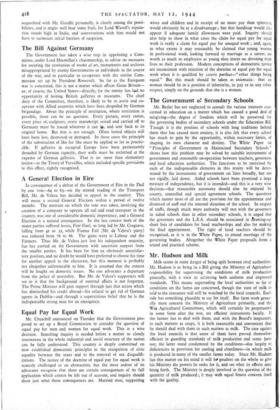The Bill Against Germany
The Government has taken a wise step in appointing a Com- mittee, under Lord Macmillan's chairmanship, to advise on measures for securing the restitution of works of art, monuments and archives misappropriated by enemy Governments or individuals in the course of the war, and in particular to co-operate with the similar Com- mission set up by President Roosevelt. So tar as the European war is concerned, this is not a matter which affects Great Britain— or, of course, the United States—directly,, for the enemy has had no opportunity of looting British galleries or museums. The chief duty of the Committee, therefore, is likely to be to assist and co- operate with Allied countries which have been despoiled by German brigandage. About the principle of restitution, where restitution is possible, there' can be no question. Every picture, every statue, every piece of, sculpture, every manuscript seized and carried off to Germany must be traced wherever it can lig, and sent back to its original home. But that is not enough. Often looted objects will have been lost, destroyed or damaged. In those cases the principle of the substitution of like for like must be applied so far as practic- able. If galleries in occupied Europe have been permanently denuded by German rapacity, their walls must be reclothed at the expense of German galleries. That is no more than elementary justice—as the Treaty of Versailles, which included specific provisions to this effect, rightly recognised.


























 Previous page
Previous page